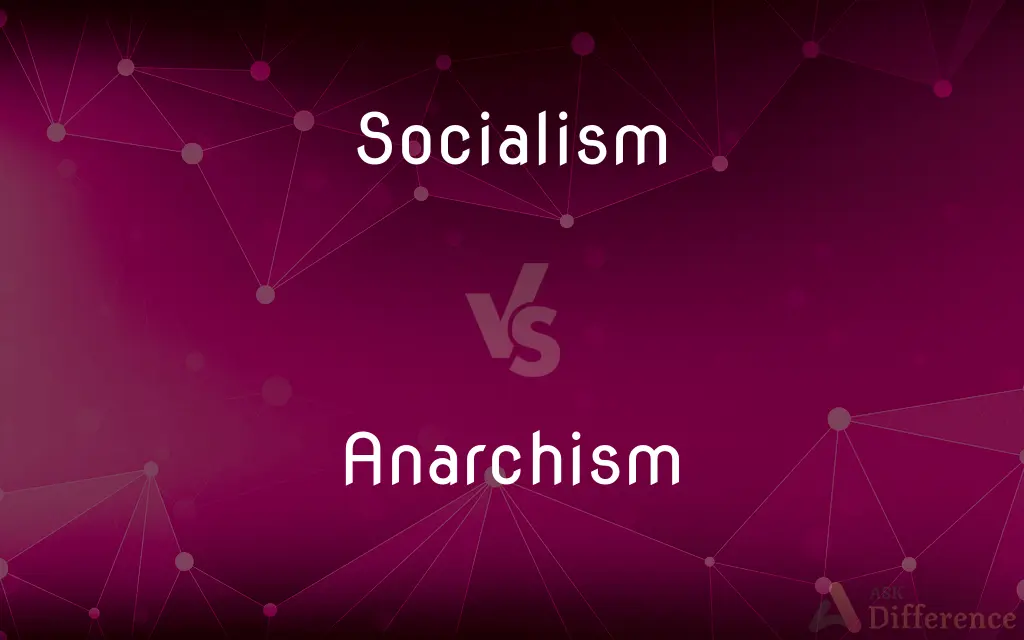Socialism vs. Anarchism — What's the Difference?
Edited by Tayyaba Rehman — By Fiza Rafique — Updated on October 13, 2023
Socialism advocates collective or governmental ownership of the means of production, while Anarchism seeks the abolition of hierarchies and centralized power structures.

Difference Between Socialism and Anarchism
Table of Contents
ADVERTISEMENT
Key Differences
Socialism is an economic and political system in which the means of production, distribution, and exchange are owned or regulated by the community or the state. On the other hand, Anarchism is a political philosophy that opposes the existence of governments and advocates for societies based on voluntary associations.
Socialism can exist in various forms, from mild social democracies to more radical forms like communism. Anarchism too has its variations, from anarcho-syndicalism which emphasizes workers' control to anarcho-primitivism which advocates a return to pre-industrial societies.
In Socialism, there's often a governing body or party that plans and directs the economy and social services. In contrast, Anarchism aims to create a society without rulers, where individuals have the freedom to make decisions autonomously, without centralized power.
The primary goal of Socialism is achieving equality through the redistribution of wealth and resources. Anarchism, while also striving for equality, emphasizes individual freedom and autonomy without the constraints of a governing authority.
Socialism, in its practical applications, has been tried in various countries with varying degrees of success. Anarchism, however, remains mostly theoretical, with few historical instances of complete anarchist societies.
ADVERTISEMENT
Comparison Chart
Nature
Economic and political system
Political philosophy
Ownership
Collective or state ownership of means of production
No centralized ownership, often communal
Authority
Can have a centralized governing body or party
Opposes all hierarchies and centralized structures
End Goal
Equality through redistribution
Individual freedom without rulers
Practical Examples
Former Soviet Union, Cuba, and modern social democracies
Zapatista territories in Mexico, certain collectives in Spain during the Civil War
Compare with Definitions
Socialism
A political ideology aiming for wealth and power equality.
Countries like Sweden have implemented versions of Socialism in their welfare systems.
Anarchism
A philosophy opposing government and centralized power.
Anarchism argues for a society based on voluntary cooperation.
Socialism
An alternative to capitalism emphasizing collective ownership.
Socialism suggests that workers should have more say in their workplaces.
Anarchism
A vision of societies based on mutual aid and free association.
Anarchism promotes a world where people cooperate out of mutual interest.
Socialism
A system where the community owns the means of production.
Many believe that Socialism can lead to more equitable resource distribution.
Anarchism
A broad spectrum including eco-anarchists to anarcho-syndicalists.
While varied in approach, all forms of Anarchism reject oppressive systems.
Socialism
A model where economic controls are regulated by the state or public.
Under Socialism, essential services like healthcare might be provided universally.
Anarchism
A system where people self-govern without imposed structures.
Historical anarchist communities demonstrated Anarchism's potential in practice.
Socialism
The transition stage between capitalism and communism according to Marx.
Marx envisioned Socialism as a necessary phase before achieving a classless society.
Anarchism
A belief in the abolition of all hierarchies and rulers.
Followers of Anarchism often advocate for community-driven solutions.
Socialism
Socialism is a political, social, and economic philosophy encompassing a range of economic and social systems characterised by social ownership of the means of production. It includes the political theories and movements associated with such systems.
Anarchism
Anarchism is a political philosophy and movement that is sceptical of authority and rejects all involuntary, coercive forms of hierarchy. Anarchism calls for the abolition of the state, which it holds to be undesirable, unnecessary, and harmful.
Socialism
Any of various theories or systems of social organization in which the means of producing and distributing goods is owned collectively or by a centralized government that often plans and controls the economy.
Anarchism
The theory or doctrine that all forms of government are oppressive and undesirable and should be abolished.
Socialism
The stage in Marxist-Leninist theory intermediate between capitalism and communism, in which the means of production are collectively owned but a completely classless society has not yet been achieved.
Anarchism
Active resistance and terrorism against the state, as used by some anarchists.
Socialism
Any of various economic and political theories advocating collective or governmental ownership and administration of the means of production and distribution of goods.
Anarchism
Rejection of all forms of coercive control and authority
"He was inclined to anarchism.
He hated system and organization and uniformity" (Bertrand Russell).
Socialism
A system of social and economic equality in which there is no private property.
Anarchism
A political and philosophical belief that all forms of involuntary rule or government are undesirable, unnecessary, or unethical, and as such that society would function without a state.
Socialism
A system or condition of society in which the means of production are owned and controlled by the state.
Anarchism
A belief that proposes the abolition of hierarchy and authority in most forms.
Socialism
(Marxism-Leninism) The intermediate phase of social development between capitalism and communism in Marxist theory in which the state has control of the means of production.
Anarchism
The doctrine or practice of anarchists.
Socialism
Any of a group of later political philosophies such democratic socialism and social democracy which do not envisage the need for full state ownership of the means of production nor transition to full communism, and which are typically based on principles of community decision making, social equality and the avoidance of economic and social exclusion, with economic policy giving first preference to community goals over individual ones.
Anarchism
A political theory favoring the abolition of governments
Socialism
Any left-wing ideology, government regulations, or policies promoting a welfare state, nationalisation, etc.
Socialism
A theory or system of social reform which contemplates a complete reconstruction of society, with a more just and equitable distribution of property and labor. In popular usage, the term is often employed to indicate any lawless, revolutionary social scheme. See Communism, Fourierism, Saint-Simonianism, forms of socialism.
[Socialism] was first applied in England to Owen's theory of social reconstruction, and in France to those also of St. Simon and Fourier . . . The word, however, is used with a great variety of meaning, . . . even by economists and learned critics. The general tendency is to regard as socialistic any interference undertaken by society on behalf of the poor, . . . radical social reform which disturbs the present system of private property . . . The tendency of the present socialism is more and more to ally itself with the most advanced democracy.
We certainly want a true history of socialism, meaning by that a history of every systematic attempt to provide a new social existence for the mass of the workers.
Socialism
A political theory advocating state ownership of industry
Socialism
An economic system based on state ownership of capital
Common Curiosities
Can Socialism coexist with democracy?
Yes, many modern social democracies blend elements of Socialism with democratic governance.
Is Socialism the same as communism?
No, while related, Socialism is often seen as a transitional phase to communism, which aims for a classless society.
What is the main goal of Socialism?
Socialism aims to achieve equality through collective or state ownership of the means of production.
Who are some famous Socialist thinkers?
Karl Marx, Friedrich Engels, and Rosa Luxemburg are among the prominent Socialist thinkers.
Are all anarchists against all forms of organization?
No, anarchists often support voluntary and non-hierarchical organizations.
Can one be both a Socialist and an anarchist?
Yes, anarcho-socialists or libertarian socialists combine elements of both ideologies.
What do anarchists propose as an alternative to the state?
Anarchists promote voluntary associations, communes, and direct democracy as alternatives.
What's an example of an anarchist community?
The Zapatista territories in Mexico or certain Spanish regions during the Civil War have anarchist principles in action.
What countries have implemented Socialism?
Countries like the former Soviet Union, Cuba, and modern nations like Sweden have implemented various forms of Socialism.
Is Anarchism always violent?
No, while some anarchists advocate direct action, many promote peaceful means to achieve a stateless society.
What does Anarchism fundamentally oppose?
Anarchism opposes hierarchies, rulers, and centralized power structures.
How do anarchists view the state?
Anarchists view the state as an oppressive institution and advocate for its abolition.
How do both Socialism and Anarchism view capitalism?
Both Socialism and Anarchism critique capitalism, but while Socialism proposes an alternative economic system, Anarchism focuses on dismantling hierarchical structures.
How do Socialism and Anarchism differ in their view of the state?
While Socialism may accept a state to manage resources and services, Anarchism seeks the state's complete dissolution.
Are there overlaps between Socialism and Anarchism?
Yes, both ideologies seek equality, but they differ in methods and views on governance.
Share Your Discovery

Previous Comparison
Monogastric vs. Ruminant
Next Comparison
Compiler vs. EditorAuthor Spotlight
Written by
Fiza RafiqueFiza Rafique is a skilled content writer at AskDifference.com, where she meticulously refines and enhances written pieces. Drawing from her vast editorial expertise, Fiza ensures clarity, accuracy, and precision in every article. Passionate about language, she continually seeks to elevate the quality of content for readers worldwide.
Edited by
Tayyaba RehmanTayyaba Rehman is a distinguished writer, currently serving as a primary contributor to askdifference.com. As a researcher in semantics and etymology, Tayyaba's passion for the complexity of languages and their distinctions has found a perfect home on the platform. Tayyaba delves into the intricacies of language, distinguishing between commonly confused words and phrases, thereby providing clarity for readers worldwide.
















































